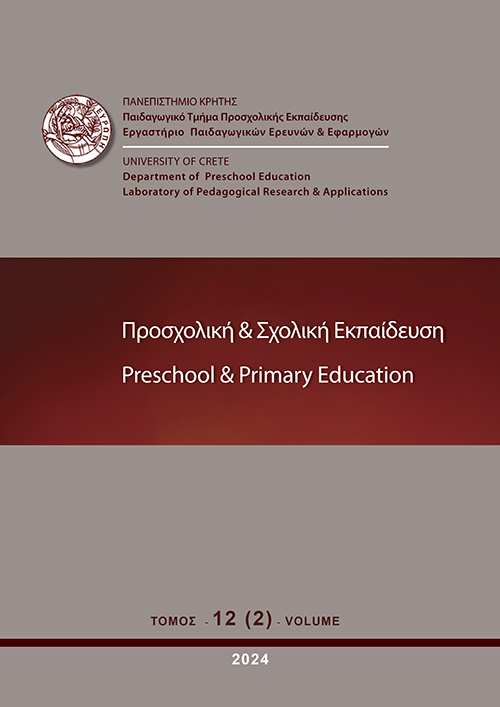Attitudes, obstacles and suggestions for family-kindergarten cooperation in the region of Crete: An overview study of the needs assessment of kindergarten teachers and parents

Abstract
This article explores the attitudes of kindergarten teachers and parents regarding cooperation between them, the barriers created by the real conditions of communication between them, as well the need to improve cooperation arising from the proposals of either side. The main aim is to propose solutions to improve communication in the complexity of the real conditions of school life in pre-school units and take into account the educational reality, the different conditions that arise, but also the interaction of related factors such as school, family and the relationship between them. To meet these goals, the methodological and theoretical design of the present study was based on theoretical models suitable for studying the complexity of factors associated with family-school collaboration, such as the "ecosystem model" developed by Bronfenbrenner (1979) and Epstein's (1996) model of 'overlapping spheres’. Based on the research questions, an overview survey was designed, implemented and evaluated during the 2022-2023 school year. The main data collection tools were questionnaires with open and closed questions, as well as semi-structured interviews with both parents and teachers. In this research 83 kindergarten teachers and 112 parents from preschool units in the region of Crete took part, while the participants were selected based on cluster sampling, after permission was granted by the Directorate of Primary Education of Crete and by the Research Ethics Committee of the University of Crete. The main findings of this study showed that parents and teachers noted that community agencies need to support cooperation between the family and school and policies need to be provided for dealing with practical issues such as the proposal of activities and home study help from teachers. Parents develop more positive attitudes about teachers than teachers develop about teachers. This is probably due to the fact that parents come into contact with far fewer teachers during their child's schooling compared to teachers. Finally, it was found that teachers are concerned about informing parents about the development and education of preschool children, understanding the role of teachers and recognizing the positive results that can arise from their collaboration with kindergarten teachers.
Article Details
- How to Cite
-
Dimitriadis, D., & Manolitsis, G. (2025). Attitudes, obstacles and suggestions for family-kindergarten cooperation in the region of Crete: An overview study of the needs assessment of kindergarten teachers and parents. Preschool and Primary Education, 12(2), 149–178. https://doi.org/10.12681/ppej.35927 (Original work published November 29, 2024)
- Section
- Articles

This work is licensed under a Creative Commons Attribution-NonCommercial-ShareAlike 4.0 International License.
Authors who publish with this journal agree to the following terms:
- Authors retain copyright and grant the journal right of first publication with the work simultaneously licensed under a Creative Commons Attribution Non-Commercial License that allows others to share the work with an acknowledgement of the work's authorship and initial publication in this journal.
- Authors are able to enter into separate, additional contractual arrangements for the non-exclusive distribution of the journal's published version of the work (e.g. post it to an institutional repository or publish it in a book), with an acknowledgement of its initial publication in this journal.
- Authors are permitted and encouraged to post their work online (preferably in institutional repositories or on their website) prior to and during the submission process, as it can lead to productive exchanges, as well as earlier and greater citation of published work (See The Effect of Open Access).


